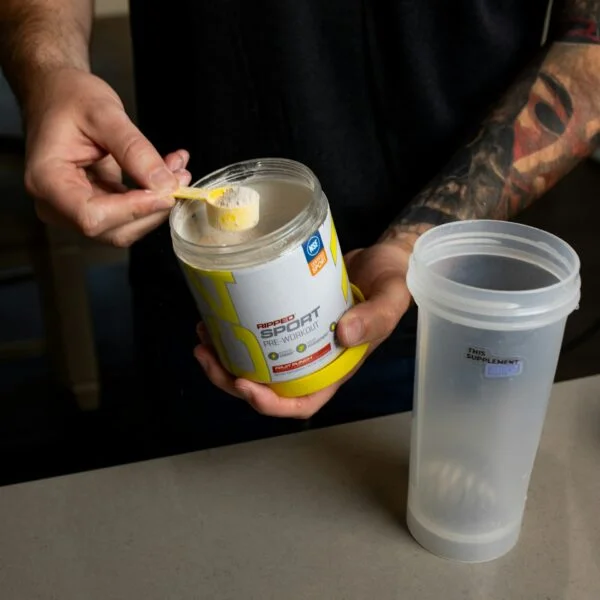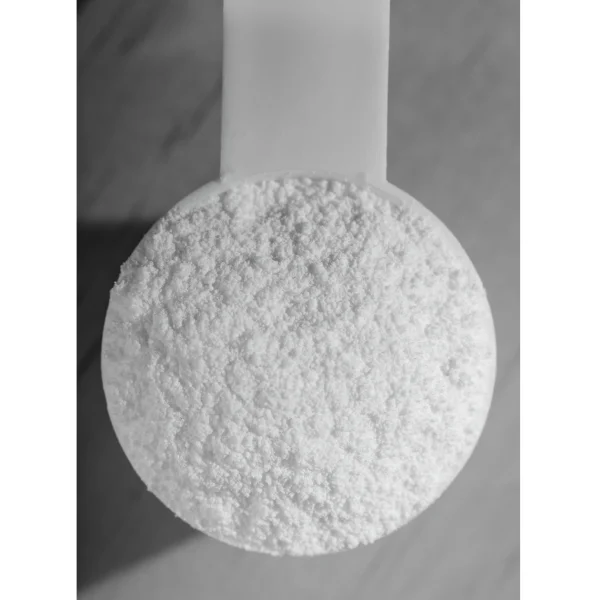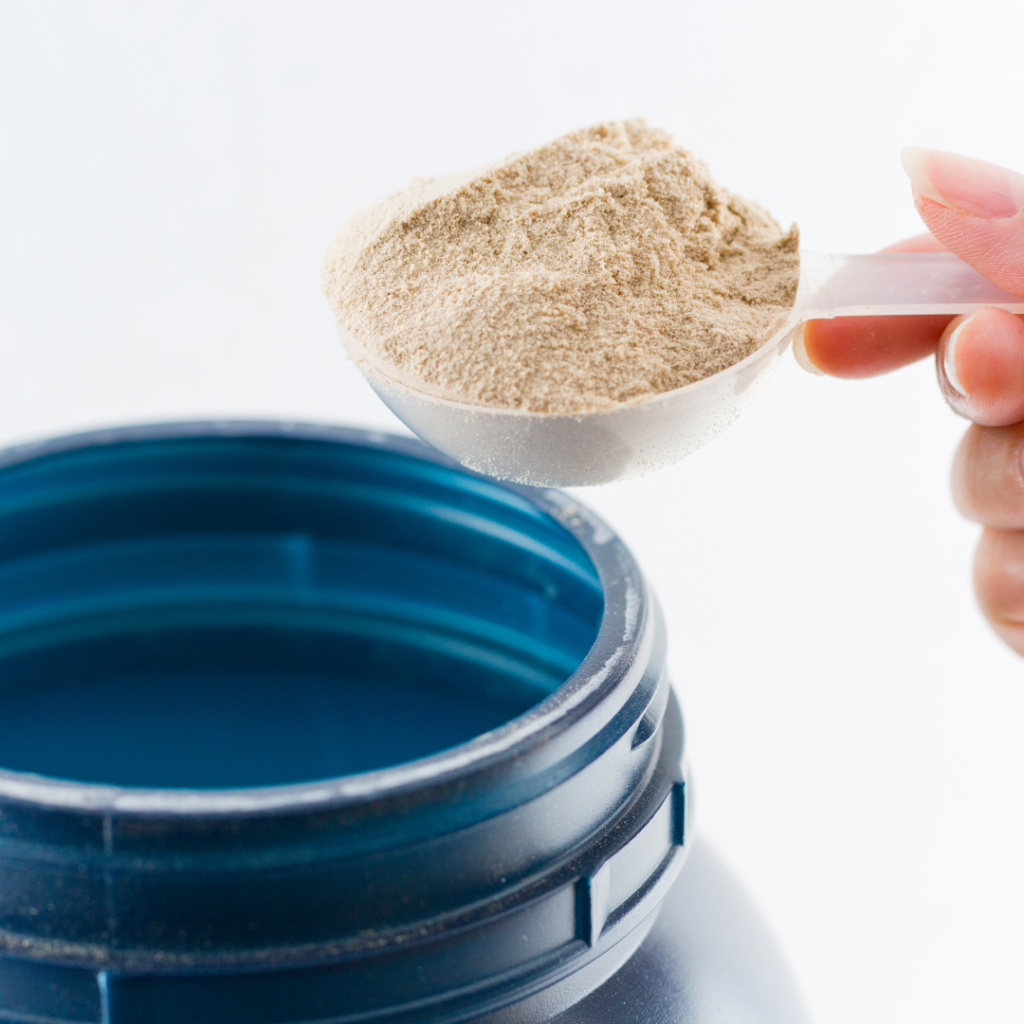Welcome to this Creatine vs Pre-workout comparisons, we’ve broken down everything—from how creatine helps build strength over time, to how pre-workout gives you that fast, intense energy boost. But we’ve also looked at cost, side effects, and which is safer for beginners.
With pre-workouts being high-stim and not for everyone, and creatine being simple, proven, and beginner-friendly—you’ve got to choose what truly fits you.
That’s exactly why, at NutritionPorts, we’ve carefully handpicked the pre-workouts and creatine supplements we genuinely believe could be the best fit for your goals. We break down how creatine actually works, how to take it properly, and why it’s often the smartest starting point—especially if you’re just getting into training. Simple, effective, and built for real progress.

Table of Contents
What is Creatine?
Creatine is a naturally occurring compound found in your muscles and brain, but when used as a supplement, it can supercharge your workout performance and muscle growth. You’ve probably heard about it in the gym, but what exactly does creatine do, and why is it so popular among athletes and fitness enthusiasts?
So Creatine supplements: What do they do?
Creatine supplements are widely known for enhancing athletic performance, particularly in short bursts of high-intensity activities like weightlifting, sprinting, and HIIT. By increasing the amount of creatine phosphate in your muscles, these supplements help regenerate energy (ATP) quickly, allowing you to perform better, push harder, and recover faster.
But that’s not all. Creatine also plays a significant role in muscle growth. It draws water into your muscles, creating a fuller, more volumized look while triggering muscle protein synthesis for faster gains. For those looking to boost their strength, build lean muscle, or simply improve exercise performance, creatine is often considered a game-changer.
So, whether you’re a pro athlete or someone just starting your fitness journey, adding creatine supplements to your routine can be a powerful move toward maximizing your results.

How And When To Take Creatine?
If you’re serious about maximizing muscle growth and performance, you’ve probably asked yourself: when should you take creatine? Some say before a workout, others swear by taking it after—but when is the best time to take creatine for real results?
Here’s the truth: timing isn’t as crucial as consistency. The key is to take creatine daily to keep your muscle stores saturated. However, if you want to optimize absorption, taking it post-workout with a meal can be ideal, as insulin helps shuttle creatine into your muscles more efficiently.
For those just starting out, a loading phase of 20g per day (split into 4 doses) for 5–7 days can quickly saturate muscles. After that, a steady 3–5g daily keeps levels high. Prefer pre-workout? That’s fine too—what matters most is that you take it every day.
Bottom line? Whether you take it before or after training, consistency wins. Stick with it, and the strength, endurance, and muscle gains will follow.

Benefits Of Creatine
Want to train harder, recover faster, and outperform the competition? Creatine is one of the most researched supplements for strength and endurance. By boosting ATP production, it fuels explosive movements—crucial for CrossFit, weightlifting, and other high-intensity sports. The best creatine for CrossFit isn’t just about strength—it’s about sustained endurance, faster recovery, and pushing past limits every single session.
- Increases explosive strength
- Enhances muscle endurance
- Speeds up recovery time
- Boosts high-intensity performance
- Supports lean muscle growth
What is Pre-Workout and How Does it Boost Performance?
Pre-workout is a supplement you take before hitting the gym to give you that extra push. It helps you feel energized, focused, and ready to crush your workout.
Here’s what you’ll find in most pre-workouts:
- Electrolytes to keep you hydrated and perform at your best
- Stimulants like caffeine for an energy boost and mental focus
- Nitric oxide boosters to improve blood flow and muscle pumps
- Amino acids to help with endurance and reduce muscle fatigue
- Nootropics for better mental clarity and focus when you need it most

How Do i Use Pre-Workout?
Knowing how to use pre-workout correctly is key to maximizing its benefits. Start by reading the instructions on the product label to find the ideal serving size. Typically, you’ll mix the powder with water about 15–30 minutes before your workout. It’s best to consume it on an empty stomach to allow your body to absorb it faster and feel the effects sooner.
If you’re new to pre-workout, begin with a smaller serving to assess your tolerance. Once you know how your body reacts, you can adjust the dose accordingly. And remember, don’t overdo it—sticking to the recommended dosage will help avoid any unwanted side effects, like jitteriness or upset stomach.
Benefits of Pre-Workout
Wondering, how much pre-workout should I take to maximize energy, endurance, and focus? The right dose fuels your body with key ingredients designed to push your limits and enhance performance. Here’s what makes pre-workout so effective:
- Caffeine – Boosts energy, sharpens focus, and delays fatigue
- Beta-Alanine – Reduces muscle fatigue by buffering lactic acid buildup
- Creatine Monohydrate – Increases power output and muscle strength
- Citrulline Malate – Enhances blood flow for better endurance and muscle pumps
- Electrolytes – Supports hydration and muscle contractions
- L-Arginine – Improves nitric oxide levels, promoting better circulation
- Tyrosine – Supports cognitive function and stress resistance
- Branched-Chain Amino Acids (BCAAs) – Helps with muscle recovery and reduces soreness
- Theanine – Smooths out the effects of caffeine, preventing crashes
- Nitrosigine – Increases nitric oxide levels for enhanced vascularity and endurance
- Black Pepper Extract – Helps your body soak up nutrients better, making every ingredient work harder
- Pomegranate – Full of antioxidants to boost blood flow and keep your muscles going strong
- Taurine – Keeps you hydrated, supports muscle function, and helps fight off workout fatigue

Is Creatine Or Pre-Workout Better For Beginners?
It’s a common question—is creatine and pre-workout the same? Not quite. The difference between creatine and pre-workout is that creatine supports long-term strength and recovery, while pre-workout gives a short-term energy boost.
So, Creatine vs Pre-Workout—which is better? At NutritionPorts, we’ve handpicked the best creatine supplement for muscle growth—and while we also feature some powerful pre-workouts, they’re not ideal for beginners. If you’re just starting out, we always recommend going with creatine first—clean, effective, and easier to stick with.
Difference Between Creatine And Pre-Workout?
When it comes to Creatine vs Pre-Workout, many gym-goers wonder: what is the difference between creatine and pre workout—and which one is best? The answer lies in their purpose.
- Creatine fuels your muscles over time, increasing strength, power, and recovery. It’s not about the immediate boost—it’s about long-term gains.
- Pre-Workout is designed for instant energy, focus, and endurance, packed with stimulants like caffeine and nitric oxide boosters to maximize your workout session.
Think of creatine as a muscle-building investment and pre-workout as a turbo boost for performance. Which one you need depends on your fitness goals.

Most Common Side effects of Creatine Supplements
Let’s clear things up—creatine is one of the most researched and widely used supplements in the fitness world. While the side effects of creatine are generally mild, some users may experience bloating, water retention, or stomach discomfort, especially when first starting out. When people ask about creatine monohydrate side effects or even the dangers of creatine, it’s usually based on myths or misuse—creatine is safe for most when taken properly.
And here’s the key: when it comes to side effects, creatine is nowhere near as intense as pre-workout. The pre-workouts we’ve picked at NutritionPorts are incredibly strong—packed with stimulants and definitely not beginner-friendly. Creatine, on the other hand, is more stable, long-term, and beginner-approved. That’s why it remains a go-to supplement for building strength with minimal risk.
Most Common Pre-Workout Side Effects
Let’s be real—pre-workout hits hard. But with that boost often come a few downsides. Some of the most common pre-workout side effects include jitters, anxiety, crash, and that itchy skin feeling (thanks, beta-alanine). And if you’re wondering how it compares, Creatine vs Pre-Workout is a totally different story—creatine supports strength and recovery long-term, while pre-workout is more about that short-term energy punch.
Like we said earlier, we’ve handpicked some of the most exclusive pre-workouts we at NutritionPorts truly stand behind. Some we’ve tried, others come highly recommended—but either way, it’s important to know what you’re putting into your body. Especially with high-caffeine formulas or blends packed with stimulants, side effects are something you don’t want to ignore. Always start smart.

Best Creatine Supplement for Muscle Growth
Klean Athlete Klean Creatine
Price: Around $35 for 60 servings.
NSF Certified for Sport, this supplement offers pure creatine monohydrate to support muscle strength and size. Perfect for individuals aiming for clean, tested products without additives.
PRODUCT HIGHLIGHTS
- NSF Certified for Sport
- Pure, micronized creatine monohydrate
- No artificial flavors, colors, or sweeteners
- Supports strength, power, and muscle recovery
- Easily mixable and unflavored

Pros & Cons
- Pros
- ✅ Third-party tested for purity and safety
- ✅ No fillers or additives
- ✅ Supports muscle growth and endurance
- ✅ Great for all types of athletes
- Cons
- ❌ Cons:
- ❌ Slightly more expensive than basic creatine
- ❌ Unflavored—may not appeal to all users
Optimum Nutrition Micronized Creatine Powder
This unflavored, micronized creatine monohydrate powder supports muscle strength and power. Great for those seeking a versatile supplement to mix with other beverages. What’s unique about this creatine is its micronized formula for better mixability and smoother texture. Plus, it undergoes banned substance testing, ensuring safety and quality for athletes.
PRODUCT HIGHLIGHTS
- Micronized Creatine Monohydrate
- Supports muscle strength and performance
- Enhances muscle hydration
- Accelerates recovery
- Unflavored for versatile mixing
- Third-Party Tested for purity

Pros & Cons
- Pros
- ✅ High-Quality Creatine
- ✅ Micronized Formula
- ✅ Versatile Usage
- ✅ Third-Party Certified
- Cons
- ❌ Expensive
- ❌ Potential Graininess
- ❌ Limited Research on Cognitive Benefits
Gnarly Nutrition Creatine Supplement
Price: $54.95 (One-time purchase) Subscription: $43.96 (20% off)
Featuring Creapure® creatine monohydrate, this product is NSF Certified for Sport, ensuring purity and quality. It’s a great choice for athletes who prioritize certified supplements and are willing to invest in top-tier products. Its clean formula makes it perfect for competitive athletes and fitness enthusiasts who demand the highest standards in their supplements.
PRODUCT HIGHLIGHTS
- NSF Certified for Sport
- Features Creapure® Creatine Monohydrate
- Vegan-Friendly & Non-GMO
- High-purity formula
- Great for strength & power athletes

Pros & Cons
- Pros
- ✅ High-quality ingredients for maximum effectiveness
- ✅ Supports muscle growth and strength
- ✅ Ideal for athletes seeking top-tier performance
- Cons
- ❌ On the pricier side
- ❌ May not mix as easily as other creatine powders
Thorne Creatine
Price:$82 /(180 Scoops) $43 /(90 Scoops)
Thorne Creatine uses micronized creatine monohydrate to help your body absorb it more easily, supporting muscle growth and improved performance. Perfect for athletes and anyone serious about fitness, it’s NSF Certified for Sport, meaning it’s pure, safe, and free from artificial additives.
PRODUCT HIGHLIGHTS
- Micronized creatine monohydrate for better absorption
- NSF Certified for Sport
- No artificial additives
- Premium quality for athletes

Pros & Cons
- Pros
- ✅ Pure and safe with no artificial ingredients
- ✅ Easily mixable formula
- ✅ Trusted brand with high-quality standards
- ✅ Third-party tested
- Cons
- ❌ On the pricier side
- ❌ Only available in unflavored option
Transparent Labs CREATINE HMB
Price around: ($49.99 30sv) ($89.99 60sv) Travel Pack (15ct.)
Want to take your muscle growth to the next level? Transparent Labs Creatine HMB delivers exactly that. Combining creatine monohydrate and HMB, it boosts muscle strength and preserves mass during intense training. Is this the best creatine supplement for muscle growth? I’d say ONE of the best Absolutely – third-party testing guarantees its purity and quality. Perfect for athletes and serious lifters looking for a clean, effective supplement to fuel their performance.
PRODUCT HIGHLIGHTS
- Combines Creatine Monohydrate and HMB for enhanced muscle growth
- Third-party tested for purity and quality
- No artificial additives or fillers
- Supports muscle strength and recovery
- Ideal for athletes and serious lifters

Pros & Cons
- Pros
- ✅ Third-party tested for guaranteed purity
- ✅ Clean, natural ingredients with no artificial additives
- ✅ Improves muscle strength and preserves muscle mass during intense training
- ✅ Ideal for athletes and bodybuilders
- Cons
- ❌ Slightly more expensive than standard creatine supplements
- ❌ Some users may not see immediate results
Best Pre-Workout For Muscle Gain And Energy
Gorilla Mode Pre-Workout Formula
Price around: -30% $41.99 with with code $59.99
Gorilla Mode Pre-Workout is built for those who demand insane energy, massive pumps, and laser-sharp focus. With 10,000mg of pure L-citrulline, 5,000mg of creatine monohydrate, and a powerful stimulant blend including 400mg of caffeine, this formula is designed to push your limits.
Looking for the best pre-workout for muscle gain and energy? Gorilla Mode maximizes nitric oxide production, enhancing endurance and muscle volumization like no other. Perfect for serious lifters and athletes who want to dominate every workout.
PRODUCT HIGHLIGHTS
- High-stimulant formula
- Maximum nitric oxide pump boost
- Improved stamina & concentration
- Large Dose of L-Citrulline & Creatine
- 15 flavors available

Pros & Cons
- Pros
- ✅ Powerful energy surge & razor-sharp focus
- ✅ High-Dose pump ingredients
- ✅ Transparent Label with no fillers
- ✅ 15 flavors
- Cons
- ❌ High-Stimulant – Not for caffeine-sensitive users
- ❌ Pretty expensive
C4 Ultimate Strength Pre-Workout Powder
Price around: One time purchase $59.99 or Subscribe & Save 30% $42.00
Another pre-workout that just doesn’t deliver? well don’t worry, not this one. C4 Ultimate Strength is loaded with Beta-Alanine for endurance, Nitrosigine® for skin-splitting pumps, and a high-stimulant, with 300mg of caffeine, matrix formula for relentless energy. Plus, Creatine Nitrate fuels explosive strength. While it’s not third-party tested, Cellucor follows strict quality control and FDA-regulated GMP standards—so you know you’re getting a well-manufactured product. For those craving next-level performance, this formula brings serious firepower.
PRODUCT HIGHLIGHTS
- High-stimulant energy matrix
- Includes Nitrosigine® For bigger, fuller muscle pumps
- Contains Creatine Nitrate for strength & power
- Beta-Alanine for endurance support
- GMP-certified manufacturing

Pros & Cons
- Pros
- ✅ Includes Creatine Nitrate for explosive power
- ✅ High caffeine matrix for intense energy
- ✅ Features Nitrosigine® for better blood flow and pumps
- ✅ Beta-Alanine for enhanced endurance
- ✅ Improves focus and mental clarity during intense workouts
- Cons
- ❌ Not third-party tested
- ❌ High caffeine content may not suit everyone
- ❌ Can be intense for stimulant-sensitive users
Imperial Nutrition Excelsior
price: £89.99 (Around $121.49) for 30 servings.
Imperial Nutrition Excelsior isn’t your average pre-workout—it’s an ultra-high stim formula designed for those who crave intense energy, laser focus, and long-lasting endurance. Unlike other pre-workouts, it delivers a unique euphoric rush, keeping you dialed in for hours. But here’s the catch—it’s strong, possibly too strong for beginners, and comes at a premium price. So, is it worth it? If you’re an experienced lifter looking for a powerful, no-crash stimulant, this might be your ultimate edge.
Imperial Nutrition Excelsior is a high-stim pre-workout with 400 mg of caffeine per serving, plus DMHA, caffeine, and other CNS stimulants, delivering a long-lasting euphoric rush. Unlike traditional pre-workouts, it also includes appetite suppression elements—great for cutting, but not ideal for bulking.
PRODUCT HIGHLIGHTS
- 400mg Caffeine per serving
- High-stim energy
- Nootropic ingredients
- Suitable for experienced users only
- Long-lasting effects

Pros & Cons
- Pros
- ✅ Extreme energy boost
- ✅ Improves focus (LONG TIME)
- ✅ No severe crash post-workout
- ✅ Sustained energy
- Cons
- ❌ Very expensive
- ❌ Overstimulating for some / Not beginner-friendly
- ❌ Contains no Creatine
- ❌ Contains no Beta-Alanine
Huge Supplements Wrecked Pre-Workout
Looking for a hardcore pre-workout that actually delivers? Huge Supplements Wrecked is packed with 375mg of caffeine, combining fast-acting and sustained-release sources for intense, crash-free energy, so the caffeine content in Wrecked Pre-Workout is 435mg from multiple sources, including caffeine anhydrous, di-caffeine malate, and theobroma malate. With 8,000mg (8g) of L-Citrulline for pumps, 3,200mg of Beta-Alanine for endurance, and nootropic ingredients for laser focus, Wrecked is known as the “strongest pre-workout on the market”, built for serious lifters who want maximum performance.
PRODUCT HIGHLIGHTS
- 435mg total caffeine from multiple sources
- 8,000mg L-Citrulline for massive pumps
- 3,200mg Beta-Alanine for endurance
- Nootropics for enhanced focus
- High-stim formula for intense workouts

Pros & Cons
- Pros
- ✅ Extreme energy and focus
- ✅ Fully dosed with premium ingredients
- ✅ Strong pump and endurance support
- Cons
- ❌ High caffeine may be too intense for some
- ❌ Not ideal for beginners
- ❌ Expensive
El Jefe Pre-Workout
El Jefe Pre-Workout by ASC Supplements is a high-stim powerhouse packed with DMHA, Eria Jarensis, caffeine, and nootropics that deliver explosive energy, intense focus, and elevated mood. What makes it unique is its rare combo of hardcore stimulants and pump-enhancing ingredients—giving you both mental drive and physical performance. It’s ideal for advanced lifters or stim-experienced users who feel like most pre-workouts just don’t hit hard enough.
PRODUCT HIGHLIGHTS
- High-stimulant formula with DMHA & Eria Jarensis
- Dual-action blend for pumps and focus
- Includes mood-elevating nootropics
- Long-lasting, crash-free energy
- Hardcore performance for advanced users

Pros & Cons
- Pros
- ✅ Massive energy and tunnel vision focus
- ✅ Mood boost and strong motivation to train
- ✅ Unique mix of stims + pump ingredients
- Cons
- ❌ Too strong for beginners or caffeine-sensitive users
- ❌ Not third-party tested for purity
Conclusion
If you’ve made it this far, you already get the vibe—Creatine vs Pre-Workout isn’t about which one’s “better,” it’s about what fits your level and your goals. Creatine is hands-down the safest, most beginner-friendly choice. It helps build muscle, boost strength, and improve recovery without the intense side effects.
Pre-workout, on the other hand, hits different. It’s loaded with stimulants, gives you crazy energy and focus—but comes with possible side effects like jitters, crashes, and sensitivity to high caffeine. Especially the ones we’ve handpicked at NutritionPorts—they’re high-stim and not made for beginners.
So if you’re new, start with the basics. Master your routine. Add pre-workout later when you’re ready to level up
Creatine vs Pre-Workout FAQs
What Does Creatine Help With In Muscle Building
Creatine boosts ATP for strength and pulls water into your muscles, helping with fullness, hydration, and faster growth.
What Does Creatine Mix Best With?
Creatine powder mixes best with water or a carb-rich drink like juice to boost absorption—especially after a workout. And while powder is the most common, creatine also comes in capsules and even tasty creatine gummies for easy use. It all comes down to what works best for your routine.
What Is The Strongest Pre-Workout Powder?
One of the strongest pre-workout powders on the market is El Jefe by ASC Supplements—loaded with high-stimulant ingredients like DMHA, Eria Jarensis, and over 400mg of caffeine. It’s built for experienced users who want intense energy, laser focus, and serious performance in the gym, a pre-workout not for beginners.
Is Pre-Workout Better Than Energy Drinks
Yes—pre-workout is made for performance, not just energy. Unlike energy drinks, it includes ingredients that boost focus, endurance, and muscle pumps during training.
Is Pre Workout A Supplement
Yes, pre-workout is a supplement made to enhance energy, focus, and endurance before your workouts. If you’re aiming to train harder and build muscle, choosing the best pre-workout supplement for muscle gain and energy can make a real difference.







